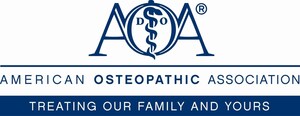CHICAGO, Jan. 6, 2020 /PRNewswire/ -- Despite the prestige of becoming a physician, 80 percent of medical students report a low sense of personal achievement, according to a new study in The Journal of the American Osteopathic Association.
Researchers surveyed 385 first- through fourth-year medical students to assess their levels of burnout, a psychological syndrome resulting from prolonged exposure to stressful work. Study authors say burnout has three dimensions: emotional exhaustion, depersonalization, and low sense of personal achievement.
"That 80 percent feel a low sense of achievement is a bit ironic, considering that these are all high-performing individuals," says Elizabeth Beverly, PhD, associate professor in family medicine at Ohio University Heritage College of Osteopathic Medicine and lead author on this study. "However, it also makes sense in that they have gone from an environment where they were standouts to one where they are now on an equal academic playing field."
Beverly adds that each year of medical school has its own unique and significant stresses that prevent students from ever fully acclimating to the challenge. In year one, students are overwhelmed by the vast amount of knowledge they have to learn. In year two, they begin studying for board examinations. Year three sends students on clinical rotations to begin real world application of their knowledge. Year four is focused on graduation and matching into a residency program.
"Throughout medical school there is always another test or requirement for students to prove themselves in a new way," says Beverly. "Over time that can feel quite discouraging."
Other areas of burnout
Beverly says only 2.3 percent of participants reported high levels of emotional exhaustion, while 17 percent reported high levels of depersonalization, a form of clinical detachment. Both of those dimensions of burnout are associated with higher perceived stress, poorer sleep quality and higher smartphone addiction scores.
Conversely, only higher perceived stress is associated with feeling a low sense of personal achievement. Beverly says she is still concerned about the role of smartphone addiction in medical students as 22 percent of participants met the basic score qualifying for smartphone addiction.
"I think the findings warrant additional research into how smartphone addiction can exacerbate burnout," says Beverly. "Increasingly, medical education incorporates smart devices, so we want to be mindful of how much we condition students to rely on them."
About The Journal of the American Osteopathic Association
The Journal of the American Osteopathic Association (JAOA) is the official scientific publication of the American Osteopathic Association. Edited by Robert Orenstein, DO, it is the premier scholarly peer-reviewed publication of the osteopathic medical profession. The JAOA's mission is to advance medicine through the publication of peer-reviewed osteopathic research.
SOURCE American Osteopathic Association

Related Links
WANT YOUR COMPANY'S NEWS FEATURED ON PRNEWSWIRE.COM?
Newsrooms &
Influencers
Digital Media
Outlets
Journalists
Opted In






Share this article